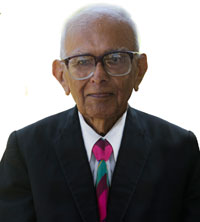
Every year on 17th October, the anniversary of the United Nations Day for the Eradication of Poverty is commemorated and people in public life all over the world join in the chorus of committing themselves to the eradication of poverty.
The present institutional and governmental commitment took its roots during the Industrial Revolution. In the 17th century and further back, religion and religious people addressed poverty and ordinary folk made their own efforts to get out of it.
Poverty not only deprives human beings of food, clothes, shelter and other necessary basic material needs, but makes it impossible for the poor to know of the cultural and educational life. Most people and their children entrapped in the net of poverty find it impossible to escape and so poverty becomes self-perpetuating.
When one reads reports on poverty or other comments on poverty, it is usually about statistics and economics and very little about the plight of poor people and their children or their sufferings.
The language of religion treats poverty as something individual and human and therefore communicates much better to the large audience. Though Hinduism, Christianity, Islam and Buddhism have their respective prescriptions in dealing with poverty, they all encouraged ordinary folk to make their own individual efforts.
It may be useful to modern planners, politicians and thinkers to study how these ordinary folk emerged from poverty and integrate some of those methods in modern planning.
Modern planning, with its provision of water to people who never had such a facility or extension of electricity supplies or expansion of cheaper public transport or building of roads in poorer areas are very commendable and desirable things for helping to minimize poverty.
It may be useful for those who are involved in programes for the elimination of poverty to closely study how the emancipated slaves and the indentures (semi-slaves) dealt with the challenge of poverty.
The freed men and the indentured labourers who managed to leave the sugar estates had absolutely nothing. They had no shelter, very little food, no clothes other than what they were wearing, no education, no medical facilities, no drinking water and very little or no money. This was the condition in the late 1830’s and 1840s.
These 19th century poor met the challenge and overcame. The freedmen founded a large number of villages – the Village Movement – and were able to provide themselves with shelter and food and other basic amenities.
The freedmen used the co-operative in their effort. These people made their clothes go as far as possible using “saddle pieces” on their trousers or even using the strong cotton in which and other grain were shipped. They and the indentures used folk medicine except for glauber and epsom salts and iodine and whatever tiny amounts of money they earned, they saved,
These freedmen and indentures gradually emerged to a better life, though still in poverty.
Then free primary education became universal from the 1870s and parents and children took to it with great enthusiasm. Books were valued and avidly read and soon village youth joined the Public Service and the Police while the more ambitious qualified as lawyers, doctors, and engineers.
The indentured labourers had the same enthusiasm for education but no schools were built in the areas in which they lived.
At great effort, they sent some children to the established villages or to the city for schooling.
These 19th century poor quickly acquired skills as craftsmen and used rain water as potable water and kerosene lamps for light, not waiting on the water company or the electricity company to supply them. These poor folk who had absolutely nothing emerged from abject poverty with an opportunity for upward mobility.
Young people to-day should cease to depend on Government or others to get them out of their plight
They could be guided by the methods their forefathers used – determination to overcome, hard work and sacrifice, making the material things they use, for example, clothes, go a longer way.
Their forefathers also grew as much of their food as possible and regularly saved whatever small sums and not consuming it all.




.jpg)









